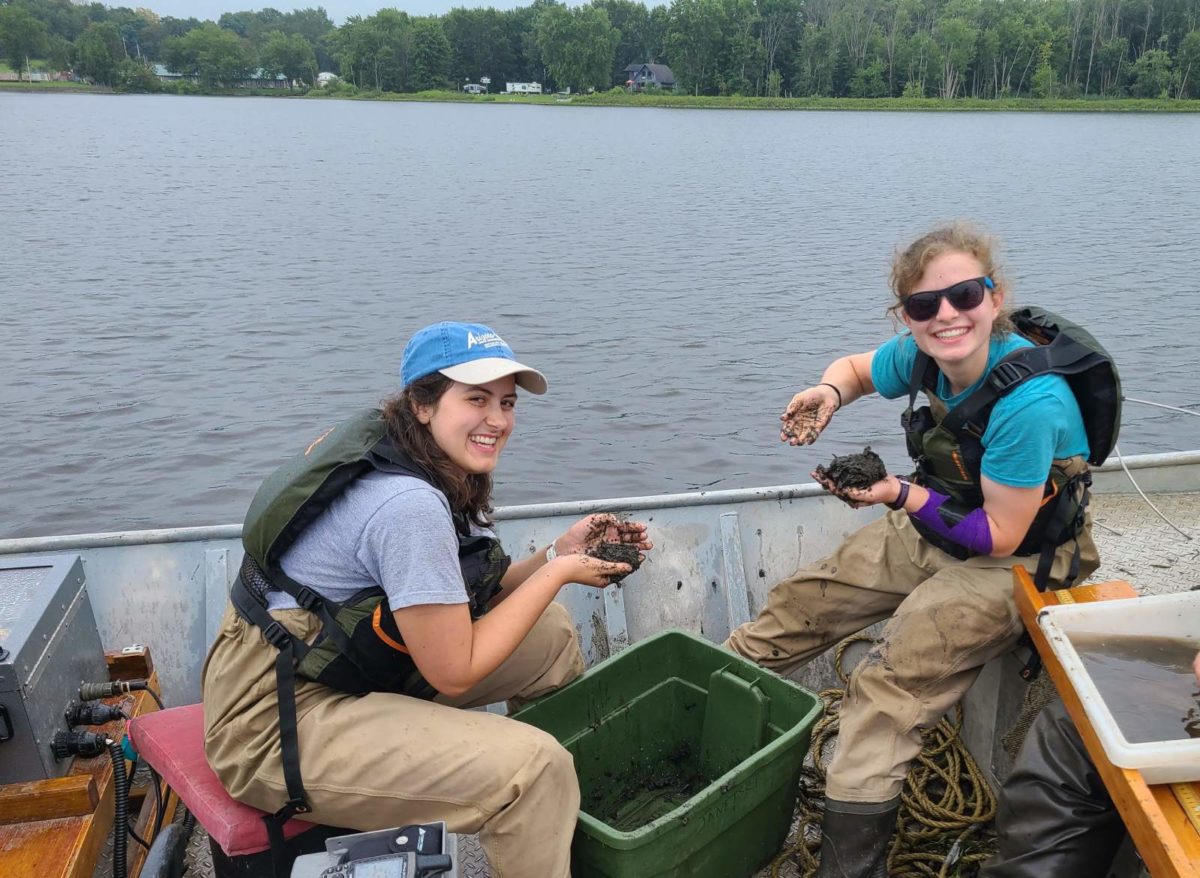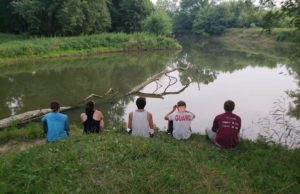Allegheny College Awarded $1.25 Million Grant From Richard King Mellon Foundation To Establish Watershed Conservation Research Center
Allegheny College has received a $1.25 million grant from the Richard King Mellon Foundation to establish a Watershed Conservation Research Center (WCRC).
 Through this new interdisciplinary center, Allegheny College faculty and students will collaborate with community partners to engage in conservation-based research and educational outreach in the upper Allegheny River basin, focusing on the French Creek watershed.
Through this new interdisciplinary center, Allegheny College faculty and students will collaborate with community partners to engage in conservation-based research and educational outreach in the upper Allegheny River basin, focusing on the French Creek watershed.
“The Richard King Mellon Foundation is a longtime and generous supporter of Allegheny College, and we are very grateful for the foundation’s vision in providing this funding to create the Watershed Conservation Research Center,” Allegheny College President Hilary L. Link said. “The center will further enhance the college’s nationally recognized commitment to sustainability and our distinctive approach to education, which challenges students to examine issues from multiple perspectives to solve problems. The grant will also help us to strengthen new and existing partnerships with our local community, allowing us to promote the immense potential of the French Creek watershed as a destination point for nature tourism and related sustainable economic development.”
Allegheny College was one of the first 10 institutions of higher education in the U.S. to achieve carbon neutrality. For the last five years, the college’s environmental science and sustainability program has been listed among the top five in the U.S. for its interdisciplinary, experiential approach.
“Allegheny College is a proven conservation partner in an important ecological region of Western Pennsylvania,” said Sam Reiman, director of the Richard King Mellon Foundation. “We are pleased to support the college’s Watershed Conservation Research Center, which will expand the college’s ability to conduct in-depth environmental research; to teach watershed stewardship; and to foster community partnerships to promote sustainable activation of the French Creek and upper Allegheny River watersheds.”

Allegheny College environmental science and sustainability faculty Casey Bradshaw-Wilson and Kelly Pearce are co-directors of the WCRC. The WCRC will address a longstanding need for a formal research center focused on the extremely biodiverse French Creek watershed, said Pearce. The center’s work will focus on three pillars: research, partnerships and education.
“Allegheny students are the foundation of this center. Our overarching goal is to teach and train them to become watershed stewards — to take what they’ve learned here and apply it to any watershed that they live in for the rest of their lives,” said Bradshaw-Wilson, an assistant professor of environmental science and sustainability who also teaches in the biology department.
Through the WCRC, Allegheny College faculty and student researchers will collect data to advance scientific knowledge to aid in the protection of aquatic and terrestrial wildlife species/habitats. Researchers will also assess the watershed’s value for regional economies. Using new and existing data, the WCRC will help to identify areas of highest conservation value and greatest need for restoration and monitoring of aquatic invertebrates, fish and wildlife species.

“We are very excited to engage our students in local conservation and foster a strong interest in watersheds, teaching the importance of treating these systems as whole systems,” said Pearce, an assistant professor of environmental science and sustainability.
Conservation is an interdisciplinary field of study and that is reflected in the center’s ethos, Bradshaw-Wilson said. “What happens on land really influences what happens in the water. And that’s why we wanted to expand the center’s focus to encompass the aquatic environment as well as the terrestrial environment, including the wildlife and people who live there.”
Pearce added that having that “bird’s eye view” will help those involved in the center better understand the watershed, identify potential problems and work with others to develop comprehensive solutions.
That broad perspective also sets the stage for faculty and students from across the Allegheny College campus to become involved in the center. “We want it to be an interdisciplinary effort where we’re not just doing physical science or ecology work,” Bradshaw-Wilson said.
For example, faculty and students could study economic factors in the watershed. The center will take an interdisciplinary approach to science communication, uniting conservation research with the creative arts, humanities and social sciences to share stories to promote the watershed and educate the public.
Partnerships with the community will also be fundamental to the WCRC’s work. “Our goal is to collaborate with all of the great community partners that do really wonderful work in the watershed and aid them in whatever way they need help,” Pearce said.
 The WCRC will engage organizations, government agencies and the private sector to create student internships, identify research needs, conduct targeted conservation research and evaluate ways to promote sustainable nature tourism. The center will use state-of-the-art technology to monitor water chemistry and quality, implement conservation actions and solutions, provide education and outreach, and promote the potential of the region to serve as a destination for ecotourism.
The WCRC will engage organizations, government agencies and the private sector to create student internships, identify research needs, conduct targeted conservation research and evaluate ways to promote sustainable nature tourism. The center will use state-of-the-art technology to monitor water chemistry and quality, implement conservation actions and solutions, provide education and outreach, and promote the potential of the region to serve as a destination for ecotourism.
In addition, the WCRC will work closely with the Allegheny College Creek Connections program, which engages K-12 students in conservation and education activities in the watershed.
“We have such wonderful students here at Allegheny,” Pearce said. “So the opportunity to work one-on-one with them in conducting meaningful research that can have a long-lasting impact on our local region is what excites us most about this opportunity.”
About the Richard King Mellon Foundation
Founded in 1947, the Richard King Mellon Foundation is the largest foundation in southwestern Pennsylvania, and one of the 50 largest in the world. The foundation’s 2020 year-end endowment was $3.1 billion, and its trustees in 2020 disbursed $130 million in grants and program-related investments. The foundation focuses its funding on six primary program areas, delineated in its 2021-2030 Strategic Plan.
About Allegheny College
Allegheny College, founded in 1815, is one of the nation’s oldest and most innovative four-year colleges where multidisciplinary learning breaks the conventional mold. It is one of the few colleges in the United States with a unique requirement to choose both a major and minor for graduation, to provide students with a cross-disciplinary path in the sciences and humanities for educational depth and intellectual growth. Located in Meadville, Pennsylvania, Allegheny College is one of 40 colleges featured in Loren Pope’s “Colleges That Change Lives.” In its 2022 rankings, U.S. News & World Report recognized Allegheny College in its Top 20 Schools for Undergraduate Research/Creative Projects and the Top 25 Most Innovative National Liberal Arts Colleges.